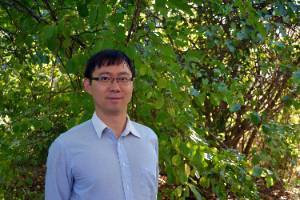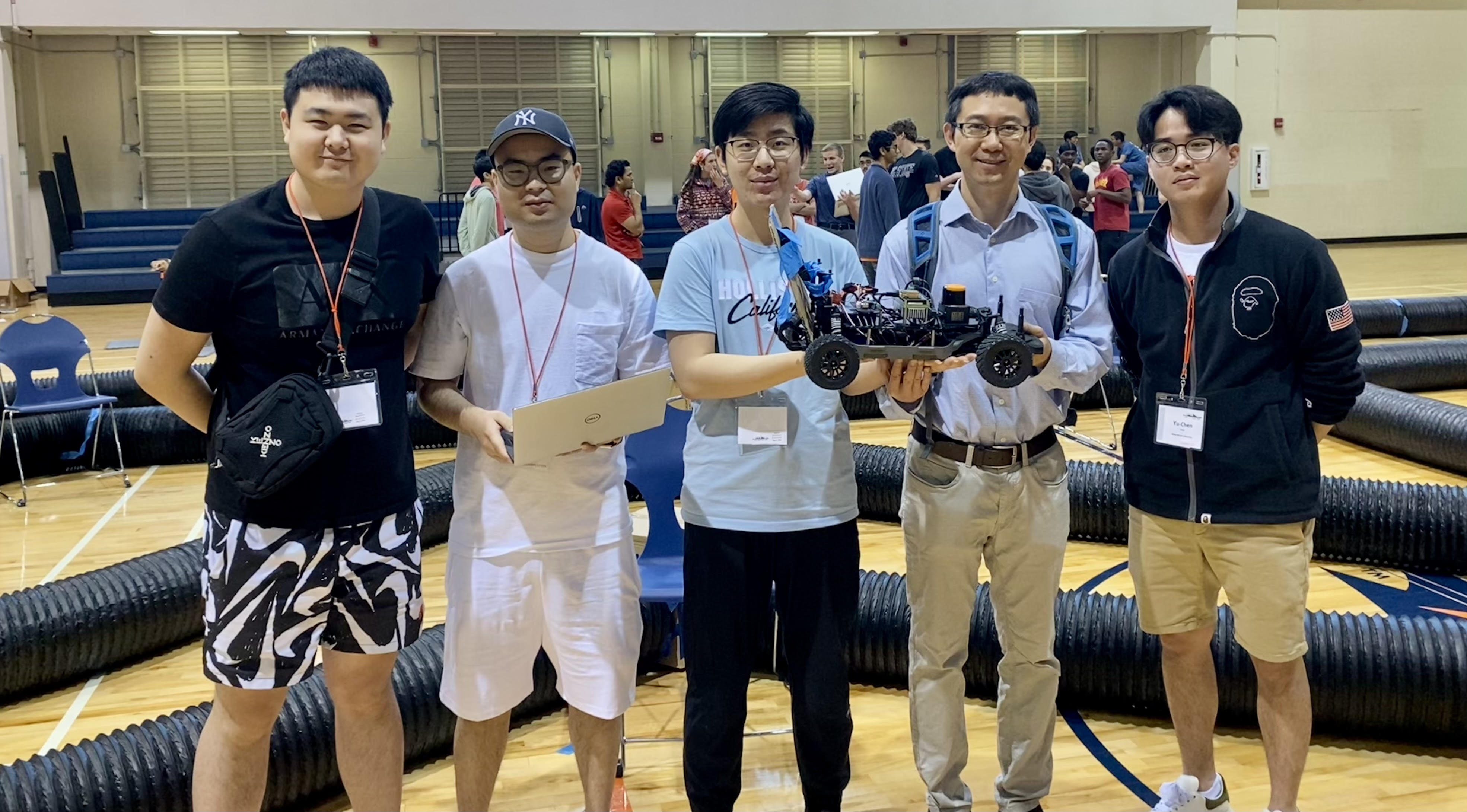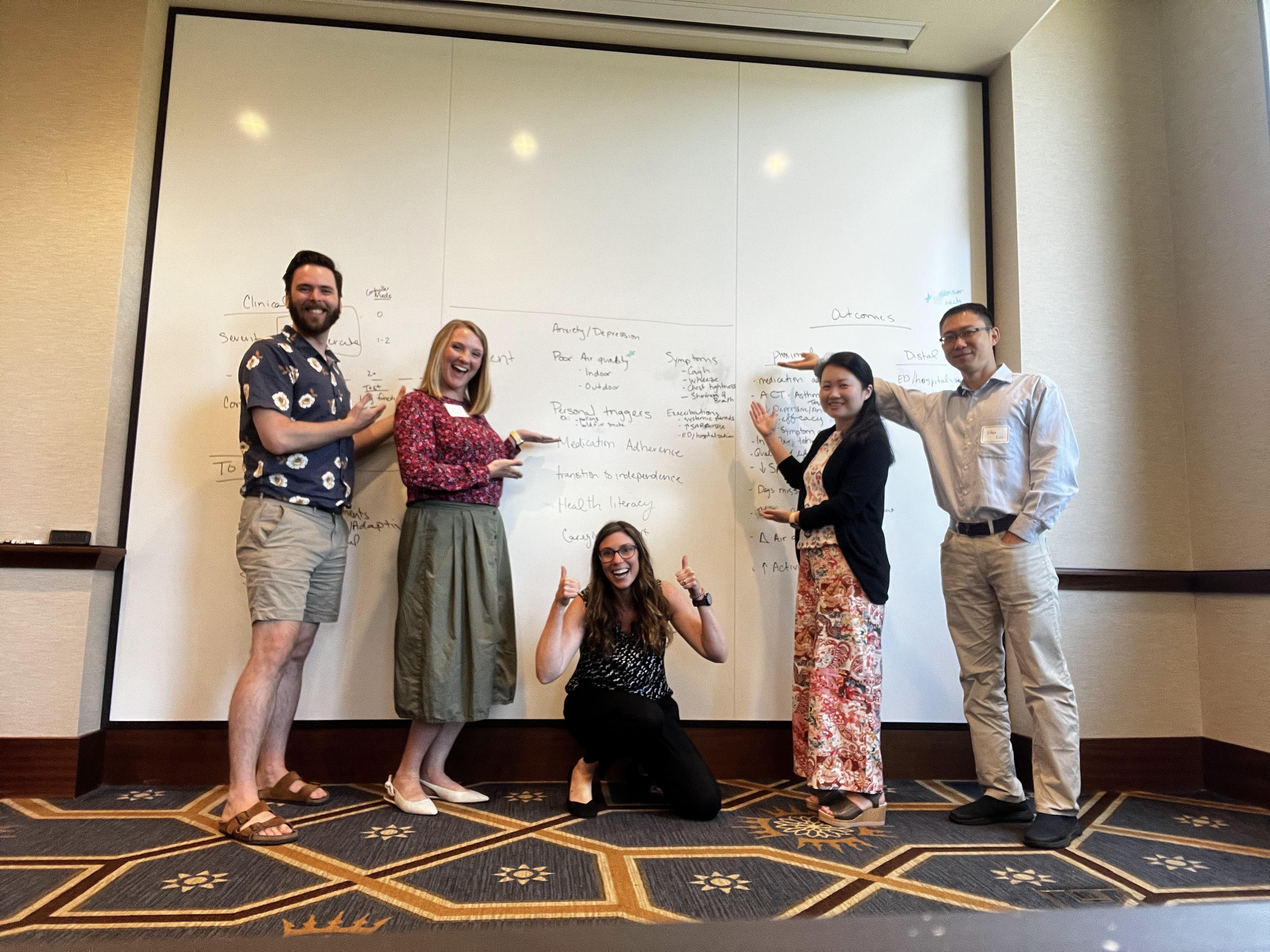Prof. Shan Lin: Empowering Systems with AI!
 |
| Professor Shan Lin |
Prof. Shan Lin envisions a future where pervasive intelligence permeates every facet of our society, transforming everything from individual medical devices in our homes to large-scale, coordinated electrical public transportation systems that we rely on.
In pursuit of this vision, Prof. Lin’s research recognizes the intrinsic value within the signals and data generated by modern systems and their users. His research methodology centers around transforming this data into actionable intelligence and integrating this intelligence to develop Cyber-Physical Systems with novel functionalities. Cyber–Physical Systems are integrations of computation with physical processes. Examples of Cyber–Physical Systems include autonomous vehicles, medical devices, smart grids, etc.
 |
| Prof. Lin and the Stony Brook University team at the 12th F1TENTH AUTONOMOUS GRAND PRIX |
Three Research Thrusts
Prof. Lin’s research group is specifically focused on three pivotal domains: smart health technologies, smart city infrastructure, and the development of resilient systems.
Smart Health
While many medical and health systems are capable of performing procedures and delivering treatments autonomously, they often lack essential patient context, including vital signs, physical activity, and mental status. This lack can significantly affect the effectiveness of the procedure or treatment, even jeopardizing patient safety. Consequently, these systems typically require extensive manual calibration and cannot function safely in a fully closed-loop fashion. Prof. Lin and his team focus on addressing this issue by incorporating real-time patient context sensing and offering personalized recommendations. This develops predictive decision support systems for medical devices, such as the artificial pancreas and the electric toothbrush.
Smart City
In the era of smart cities, intelligence is increasingly integrated into urban infrastructure and services, enhancing efficiency across individual city services. For instance, on-demand ride services and patrol operations leverage predictive analytics to optimize their operations. However, the interconnection of multiple services operated by diverse stakeholders can lead to tight couplings or even conflicts. As Electric Vehicles (EVs) gain popularity, the mutual reliance between EV fleet-based transportation services and the power grid grows. Prof. Lin’s project is dedicated to developing frameworks and algorithms that enable smart services to autonomously achieve Pareto optimal performances on a large scale. Here Pareto optimal is a technical term in game theory, which refers to a state where no action or allocation is available that makes one individual better off without making another worse off.
Resillient Systems
Resilient systems, such as autonomous vehicles, power grids, and medical devices, are expected to exhibit safety- or mission-critical behavior even in the presence of internal faults or external disturbances. Reasoning about resilience in cyber-physical systems and creating resilient systems are considered an open challenge in the recently published IEEE Control for Societal-scale Challenges: Road Map 2030. In response to this challenge, Prof. Lin and his collaborators have developed a framework based on Signal Temporal Logic (STL) for specifying and reasoning about resiliency in CPS. Furthermore, they have designed a framework for resilient control of CPS subject to STL-based requirements.
The Approach
Prof. Lin’s research is driven by real-world data and emerging system requirements and focuses on integrating intelligence into Cyber-Physical Systems.
Prof. Lin and his group closely collaborate with experts from medical schools, hospitals, and city governments on interdisciplinary projects. The group collaborated with an endocrinologist at the Stony Brook Diabetes Center for an artificial pancreas project. Additionally, they engage with the city government of Newark on a smart city initiative. These collaborations not only grant access to valuable data but also facilitate the deployment and testing of their solutions in clinical and real-world environments.
Prof. Lin’s research potentially has significant impacts, including enhancements in patient safety and the quality of home healthcare within medical systems, increased flexibility, and reduced operational costs for city services, as well as the development of more resilient drones and microgrids.

Eureka!
Prof. Lin finds it fascinating to envision the future of the world and computing systems. He enjoys pondering how AI could shape medical systems, city infrastructure, and resilient systems. This imaginative process often sparks his creativity. During moments of deep reflection, like on a long drive, Prof. Lin often finds himself gaining fresh perspectives on the problems he’s considering. During his work on electrical toothbrush systems, Prof. Lin and his team noticed that popular brands like Oral-B and Philips utilize motion sensors and even camera sensors to monitor toothbrushing, yet they often lack precision in tooth surface coverage and tracking accuracy.
After evaluating this challenge for a month, an idea struck him: the rotation of the toothbrush head, powered by a motor, could generate a unique magnetic field enabling precise localization within a user’s mouth. Building on this insight, Prof. Lin and his team developed a magneto-inductive sensing-based electrical toothbrushing system that surpassed existing market solutions. Their findings were published in a paper presented at MobiCom in 2020.
In a future scenario of where AI manages city services, challenges arise when these services need to cooperate or resolve conflicts with one another. Given their diverse goals and stakeholders, finding a clear solution seems elusive. After extensive contemplation, an unconventional idea emerged: what if AI agents could communicate and negotiate with each other independently to reach mutually beneficial solutions? This inspired Prof. Lin and his team to develop a framework called DeResolver for future smart city services. Their innovative approach was recognized with the Best Paper Award at ICCPS 2021.
Research at Stony Brook University
Prof. Lin’s research has been funded by NSF, DOE, and industry, such as Bosch Research. The group has obtained patents on a number of their works. Students love to work on real problems that have real-world impacts. Considering the popularity of health and IoT applications among students, the research experience is expected to significantly promote the research involvement of students, which could have a long-lasting impact on their careers as scientists and engineers.
Below are some of Prof. Lin’s PhD students who recently graduated:
Kin Sum Liu (Machine Learning Researcher at X Corp.)
Hua Huang (Assistant Professor at the University of California, Merced)
Hao-Tsung Yang (Assistant Professor at National Central University, Taiwan)
Yukun Yuan (Assistant Professor at the University of Tennessee Chattanooga)
Hongkai Chen (Assistant Professor at the Chinese University of Hong Kong, Hong Kong)
Prof. Lin is very grateful to all of his students and collaborators, including his PhD advisor John A Stankovic, and to Jie Wu, Insup Lee, George Pappas, Jie Gao, and Scott Smolka for their support of his work.
Finally, Prof. Lin uses his research results to develop graduate and undergraduate course modules, such as ESE 534 Cyber Physical Systems and ESE 543/343 Mobile Cloud Computing.
AI is increasingly present in all aspects of technology and our society. This is due to the work and efforts of researchers like Prof. Lin, his students, and his collaborators.
